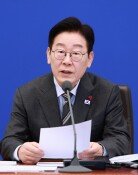Retired Japanese Bureaucrats Challenge Bureaucracy
Retired Japanese Bureaucrats Challenge Bureaucracy
Posted June. 17, 2008 03:54,
Retired Japanese public servants have set up a think tank to monitor government officials and challenge their countrys powerful bureaucracy.
The Japanese daily Asahi Shimbun reported yesterday that a group of retired Japanese officials who seek to tame bureaucracy will hold its inaugural assembly before the extra Diet session opens in mid-August.
The group is led by former officials critical of Japans bureaucratic politics.
Based on their experiences in the public sector, they plan to monitor government policies and expose cases in which officials fail to implement core elements of policies or distort them.
The group will be led by independent lawmaker Kenji Eda, who was state affairs secretary under the government of Prime Minister Ryutaro Hashimoto. Hashimoto had pursued comprehensive reform to halve the size of Japans central government during his term.
Former public officials who were not favored by their former ministries, such as getting select appointments after retirement, are eligible for group membership. Those with party affiliations cannot join, however, to prevent the groups association with a political line.
Those expressing interest in joining the group are mostly former public servants in their 40s and 50s who worked in culture, science, finance, transportation, agriculture and forestry, and economy and industry. Most are teaching at universities while others are leading provincial governments and public organizations.
The groups long-term goal is to build a think tank confronting the problems of Kasumigaseki, or the location of most of Japans ministry offices and a nickname for the executive branch.
The Asahi Shimbun said the group could influence the reshaping of Japanese politics if Kasumigaseki reform becomes an issue.
Though Japans bureaucracy was once touted as a leading force in national development, its reputation has been tarnished by criticism that conflicts of interest by public servants led to many useless policies impeding economic growth. Other criticisms include parachute appointments, wasteful budget execution and general inefficiency.
Frequent replacement of posts, especially those of ministers, made it hard for politicians to become experts on the governments policies, projects and administrative work. This gave rise to compartmentalized administration and strengthened solidarity among officials who shared common interest within ministries whose organizational response hindered any government reform.
Given this political reality, the group was formed under the mentality, Those who can see through bureaucrats maneuvers and clearly understand the problem are those who know what it is like to be part of that society.
A public official reform law passed by the Diet on June 6 reflects a strong commitment to keep bureaucrats in check. The law allows the Japanese cabinet to manage all appointments of ministry officials, thereby weakening the bureaucracys power and keeping compartmentalized state offices and system in check.
sya@donga.com







